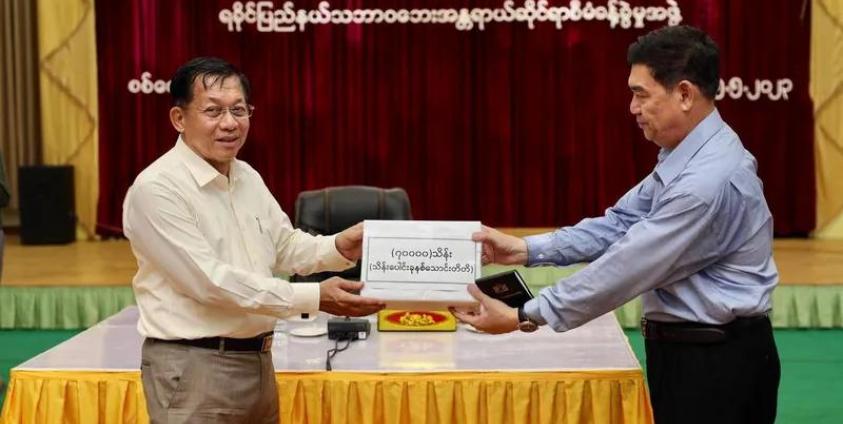Cyclone Mocha, the largest and most devastating natural disaster to hit Rakhine State, has inflicted immense physical and psychological suffering upon millions of Rakhine people.
Almost two months after the cyclone, Rakhine student leaders and social activists in the region have expressed that the Military Council, as the current ruling body in the country, has been unable to address the fundamental physical needs of the Rakhine people, leaving their psychological well-being neglected as well.
A young leader of the Arakan Students' Union said, "After the cyclone, the Military Council provided rice and relief supplies to the affected people. However, this action has faced considerable criticism in the media. The reason being, the entire village received only 10 sheets of zinc roofing, and each household received just one meal's worth of rice. The support provided by the Military Council was deemed insufficient, considering the urgent physical needs of the people, and has been regarded as a source of great shame."
He emphasized that the Military Council's performance in the rehabilitation sector can be observed through their inability to adequately provide essential supplies such as shelter, food, and medicine to the people affected by the cyclone in Rakhine State.
In addition, he pointed out that the Military Council's failure to address the physical needs of the cyclone-affected people was compounded by their obstruction of aid from international organizations and the hindrance of assistance from local civil organizations. This situation further exacerbated the mental health challenges faced by those affected by the cyclone.
"The ministers appointed by the Military Council lack a genuine focus on the well-being of the people. Some of them fail to visit the afflicted areas and provide comfort to those in suffering. As a result, the Military Council is unable to provide the necessary physical and emotional healing to those affected by the cyclone. Furthermore, even in the presence of philanthropic efforts, the military council has issued statements that serve as psychological threats," he said.
Cyclone Giri in 2010, Cyclone Mala in 2006, Cyclone Komen in 2015, and Cyclone Mora in 2016 have all caused significant damage in Rakhine State. However, Cyclone Mocha is considered the strongest among them.
According to reports, the Military Council has stated that they donated 7,000 million kyats for the recovery efforts in the Rakhine region following the cyclone. However, some have raised concerns that this gesture is primarily aimed at gaining a positive reputation rather than effectively supporting the affected people. Moreover, there are criticisms regarding the slow progress of the recovery work, which remains incomplete even after two months since the occurrence of the cyclone.
Cyclone-affected people and social activists report that the Military Council, in order to preserve its image, has provided limited food assistance. Each household reportedly receives only one packet of Mamee noodles, a small amount of oil, and a single meal's worth of rice. This minimal provision has led to criticism from those affected and social activists.
Likewise, as a result of the cyclone, houses, farmland, cattle, and seed rice were destroyed, causing significant distress for Rakhine farmers. Farmers have expressed their disappointment with the Military Council's provision of seed rice, stating that it has been inadequate to address the great challenges they face.
A young social activist from Rathedaung said, "There are very few people who are devoted to the people in the Military Council, while many others are opportunists. Corruption among their staff results in wastage, with little help reaching those in need. For instance, numerous relief resources, upon arrival at the townships, are lost under the control of local administrations, failing to reach those who are truly in desperate need."
In addition, the Military Council has been targeting NGOs, INGOs, and relief workers who are offering aid to the people affected by the cyclone. This harassment by the Military Council further intensifies the suffering of those impacted by the cyclone, impeding relief efforts and hindering much-needed support.
July 14 will mark exactly two months since Cyclone Mocha made landfall in Rakhine on May 14.
According to sources, millions of Rakhine people are still enduring physical and psychological hardships, and there are concerns that the Military Council's limitations on relief agencies may further exacerbate the situation.







